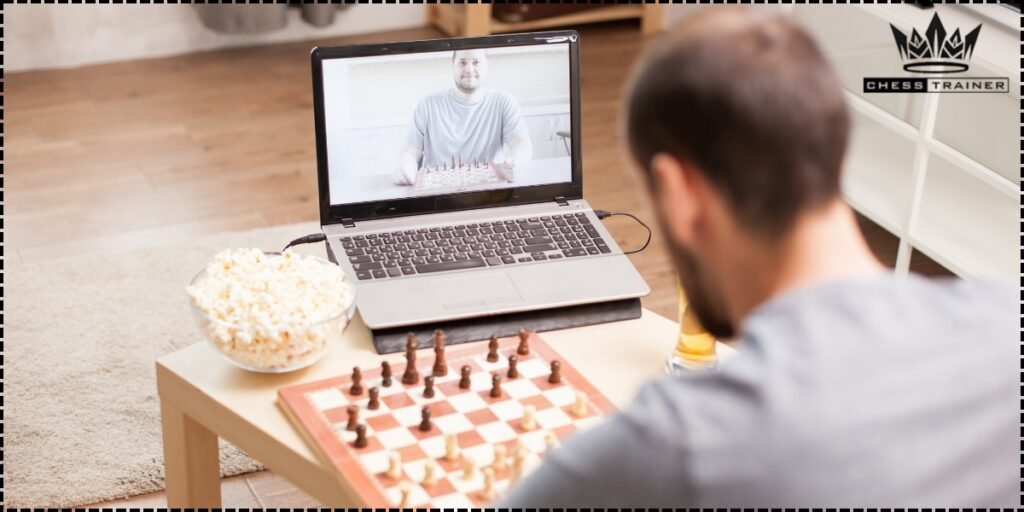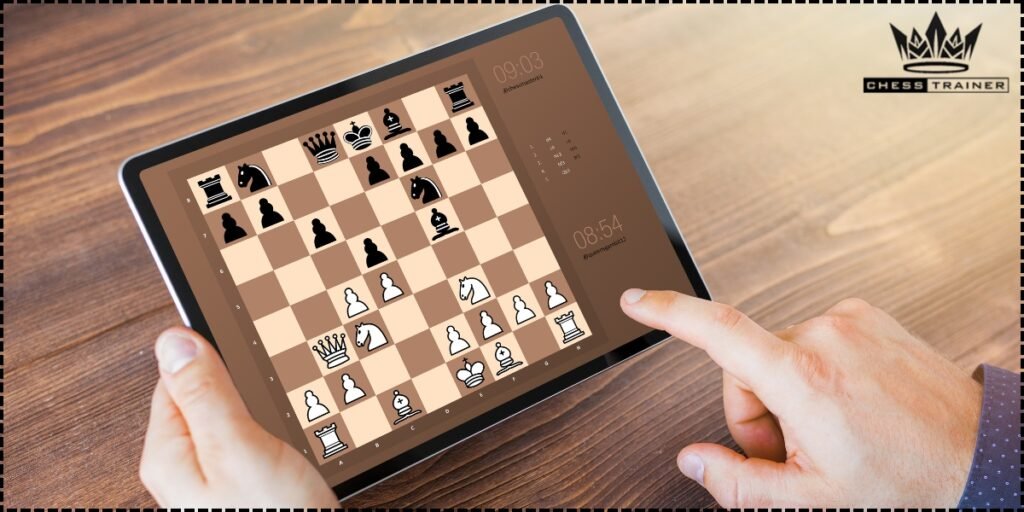Common Mistakes in Online Chess Training (And How to Avoid Them)
Chess is a game of strategy, patience, and constant learning. With the rise of digital platforms, Common Mistakes in Online Chess Training have become a hot topic for players looking to sharpen their skills from the comfort of home. Whether you’re a beginner or an intermediate player, online chess training offers incredible opportunities to improve, but it’s easy to fall into traps that hinder progress. In this 2000+ word guide, we’ll explore five Common Mistakes in Online Chess Training, share actionable Online chess training tips, and help you avoid Chess learning mistakes to avoid so you can elevate your game.
Guided by insights from FIDE Instructor Dhanesh Shrikhande, this blog will dive into best practices for online chess training, highlight Chess training errors, and offer strategies for Improving your chess game online. From Mistakes in chess strategy to leveraging Online chess tutorials, we’ll cover everything you need to know to train smarter. Let’s get started and turn those Common Mistakes in Online Chess Training into opportunities for growth!
Why Common Mistakes in Online Chess Training Matter
Online chess training has revolutionized how players learn, with platforms offering lessons, puzzles, and games at your fingertips. However, without the right approach, you might be wasting time or even reinforcing bad habits. Common Mistakes in Online Chess Training can slow your progress, frustrate you, and make it harder to achieve your goals. By understanding these pitfalls and applying How to train for chess effectively, you can make the most of your training sessions.
FIDE Instructor Dhanesh Shrikhande emphasizes that “online chess training is a powerful tool, but only if you approach it with intention and discipline.” Whether you’re using Online chess tutorials or practicing on apps, avoiding Chess training errors is key to Improving chess skills. Let’s explore the five most Common Mistakes in Online Chess Training and how to steer clear of them.

Mistake 1: Playing Too Many Games Without Analysis
One of the biggest Common Mistakes in Online Chess Training is jumping from one game to another without reviewing your moves. Online platforms make it easy to play dozens of games in a single session, but quantity doesn’t always equal quality. Without analyzing your games, you’re missing out on opportunities to learn from Mistakes in chess strategy and improve.
Playing without analysis means you’re likely repeating the same errors, whether it’s poor opening choices or tactical oversights. Chess learning mistakes to avoid include assuming that more games automatically lead to improvement. According to FIDE Instructor Dhanesh Shrikhande, “Each game is a lesson, but only if you take the time to understand what went wrong and why.”
- Review Every Game: Use the analysis tools available on most chess platforms to go through your moves. Identify where you went wrong and why.
- Focus on Key Moments: Look for critical positions where the game shifted, such as missed tactics or positional errors.
- Use Online Tools: Platforms offer Chess training resources like game analysis engines and databases to help you understand your mistakes.
- Set a Limit: Instead of playing 20 games, play 5 and spend time analyzing each one. This is one of the best practices for online chess training.
- Seek Expert Feedback: Occasionally, consult a coach like FIDE Instructor Dhanesh Shrikhande to get personalized insights.
By incorporating these Online chess training tips, you’ll turn every game into a stepping stone for Improving your chess game online.
Mistake 2: Neglecting Tactical Training
Another Common Mistake in Online Chess Training is underestimating the importance of tactical puzzles. Tactics are the building blocks of chess, and skipping them can lead to chess training errors that cost you games. Many players focus on openings or endgames but overlook the Mistakes in chess strategy that arise from weak tactical skills.
Tactics decide most games at the beginner and intermediate levels. If you’re not solving puzzles regularly, you’re missing chances to spot forks, pins, and other game-changing moves. Chess learning mistakes to avoid include thinking tactics are only for advanced players. As FIDE Instructor Dhanesh Shrikhande notes, “Tactics are the language of chess-without them, you can’t speak fluently.”
- Solve Daily Puzzles: Dedicate 10–15 minutes daily to tactical puzzles. This is a key Online chess training tip.
- Use Themed Puzzles: Focus on specific tactical motifs like discovered attacks or skewers to build pattern recognition.
- Track Progress: Monitor your puzzle-solving accuracy to gauge improvement.
- Incorporate Tactics into Games: After each game, check if you missed tactical opportunities using analysis tools.
- Leverage Resources: Explore Chess training resources like books or Online chess tutorials focused on tactics.
By prioritizing tactical training, you’ll avoid Chess training errors and start Improving chess skills faster.
Mistake 3: Over-Reliance on Opening Memorization
A third Common Mistake in Online Chess Training is obsessing over opening theory at the expense of other skills. While learning openings is important, memorizing long sequences without understanding the ideas behind them can lead to Mistakes in chess strategy and stunt your growth.
Openings are only a small part of the game. If you spend all your time memorizing moves, you may struggle in the middlegame or endgame. Chess learning mistakes to avoid include thinking that a perfect opening guarantees a win. FIDE Instructor Dhanesh Shrikhande advises, “Understand the principles behind the moves, not just the moves themselves.”
- Learn Opening Principles: Focus on controlling the center, developing pieces, and king safety rather than memorizing lines.
- Study Model Games: Watch Online chess tutorials featuring classic games to see how strong players handle openings.
- Practice Flexibility: Experiment with different openings to build adaptability.
- Balance Your Study: Allocate time to middlegame tactics and endgame techniques alongside openings.
- Use Databases: Explore opening databases in chess training resources to understand common plans and ideas.
This approach aligns with best practices for online chess training and ensures you’re Improving your chess game online holistically.

Mistake 4: Ignoring Endgame Fundamentals
Endgames are often overlooked, making them a frequent Common Mistake in Online Chess Training. Many players focus on flashy tactics or openings but neglect the skills needed to close out a game. This is one of the Chess training errors that can turn winning positions into draws or losses.
Endgames require precise calculation and technique. Without practice, you might miss simple checkmating patterns or fail to convert a material advantage. Chess learning mistakes to avoid include assuming endgames are less important than other phases. FIDE Instructor Dhanesh Shrikhande stresses, “A strong endgame separates good players from great ones.”
- Study Basic Endgames: Learn key positions like king and pawn vs. king or rook and king checkmates.
- Practice Endgame Drills: Use Chess training resources endgame trainer to build confidence.
- Analyze Your Endgames: Review your games to spot where endgame errors occurred.
- Watch Tutorials: Seek out Online chess tutorials focused on endgame techniques.
- Play Endgame Positions: Set up specific endgame scenarios against a computer or friend to practice.
By addressing this Common Mistake in Online Chess Training, you’ll master How to train for chess effectively and win more games.
Mistake 5: Lack of a Structured Training Plan
The final Common Mistake in Online Chess Training is training without a clear plan. With so many Chess training resources available, it’s easy to jump between puzzles, videos, and games without direction. This lack of structure can lead to slow progress and frustration.
Random training doesn’t build skills systematically. Without goals or a roadmap, you’re less likely to address weaknesses or track improvement. Chess learning mistakes to avoid include treating online chess training like a hobby rather than a discipline. FIDE Instructor Dhanesh Shrikhande says, “A plan gives purpose to every training session.”
- Set Clear Goals: Decide what you want to achieve, like raising your rating or mastering a specific opening.
- Create a Schedule: Dedicate specific days to tactics, openings, endgames, and game analysis.
- Track Progress: Use a journal or app to log your training and results.
- Mix Resources: Combine Online chess tutorials, puzzles, and coached sessions for variety.
- Seek Guidance: Work with a coach like FIDE Instructor Dhanesh Shrikhande to develop a personalized plan.
A structured approach is one of the best practices for online chess training and ensures you’re Improving chess skills consistently.
Additional Online Chess Training Tips
To further enhance your training, consider these Online chess training tips:
- Join a community: Engage with other players on forums or Discord to share insights and stay motivated.
- Watch Live Streams: Platforms like Twitch feature strong players explaining their thought processes.
- Take Breaks: Avoid burnout by balancing training with rest.
- Experiment with Time Controls: Play both blitz and classical games to develop different skills.
- Stay Positive: Chess is a journey, so celebrate small victories along the way.
These tips complement How to train for chess effectively and help you avoid Chess training errors.
FAQs About Common Mistakes in Online Chess Training
1. What are the Common Mistakes in Online Chess Training?
A: Common Mistakes in Online Chess Training include playing without analysis, neglecting tactics, over-relying on openings, ignoring endgames, and lacking a structured plan.
2. How can I avoid Chess learning mistakes to avoid?
A: To avoid Chess learning mistakes to avoid, review your games, prioritize tactical training, study opening principles, practice endgames, and follow a structured training plan.
3. What are the best practices for online chess training?
A: Best practices for online chess training include analyzing games, solving puzzles daily, balancing study across game phases, using Chess training resources, and setting clear goals.
4. How do I start Improving my chess game online?
A: Start Improving your chess game online by using Online chess tutorials, practicing regularly, analyzing your games, and seeking feedback from coaches like FIDE Instructor Dhanesh Shrikhande.
5. What Chess training resources should I use?
A: Top Chess training resources include Online chess tutorials, chess books, and coaching sessions with experts.
Also Read: How to Choose the Right Online Chess Coach or Program – Chess Trainer
Conclusion
Common Mistakes in Online Chess Training can hold you back, but they’re easy to avoid with the right approach. By analyzing your games, prioritizing tactics, balancing your study, mastering endgames, and following a structured plan, you’ll unlock your full potential. With guidance from FIDE Instructor Dhanesh Shrikhande and the Best practices for online chess training outlined here, you’re well on your way to Improving chess skills and enjoying the game more than ever.
Ready to take your chess to the next level? Visit chesstrainer.com for expert coaching, tailored plans, and resources to help you avoid Chess training errors and master How to train for chess effectively. Start your journey today and turn those Common Mistakes in Online Chess Training into opportunities for growth!
👉 Follow Us on Social Media! Stay Connected & Stay Ahead! 👇
📘 Facebook || 📸 Instagram || 💼 LinkedIn || 🎯 Twitter || 📌 Pinterest

